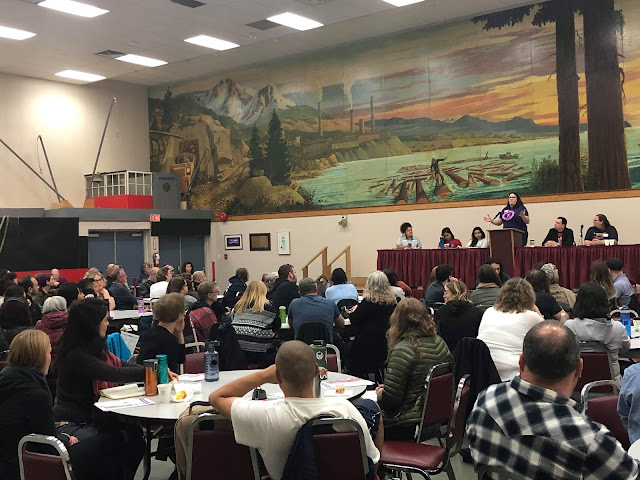Reel Causes: Luk'Luk'I
 |
| Tanya Fader (PHS), Angel Gates and the moderator from Reel Causes |
My friend Dionne invited me to attend a screening of Wayne Wapeemukwa's film Luk'Luk'I at the theatre at SFU Woodward's. Organized by Reel Causes, it was a fundraiser in support of the Portland Hotel Society (shout out to CUPE 1004 and CUPE 1936 who rep the workers).
The theatre was packed by the time we got there and judging by the energy in the room, I knew we were in for an interesting evening.
Culture Saves Lives Women Spirit Drummers introduced themselves and gave acknowledgement to Tracey Morrison, a well-known DTES activist who we lost last year and before they treated us to"Strong Woman's Song," they recognized all of the sisters up at the front alongside them event if you can't see them (MMIWG). The song's history is rooted by women in the Kingston Pen. The song helped keep women strong and connect their spirits. It was the first time some of them ever performed in front of an audience and they were great!
Tanya Fader, Manager of the Rainier Hotel for Women said a few words before the film started. She spoke of the close-knit community of the residents of the DTES and how gentrification and colonization go hand in hand as the neighbourhood changes.
 The film itself is an interesting blend of documentary and fantasy that follows 5 main characters in the DTES during the 2010 Olympics. I didn't know that Luk'Luk'I was the indigenous name of the DTES. The film is gritty - some parts are not easy to watch. Tragic, resilient, powerful and raw, you see everything whether literal or metaphorical or symbolic. Drug use, sex trade, HIV, addiction, family, love, disability, community, violence - all covered in under 2 hours. The performances were fantastic - the natural talent of each actor gave the film realism that made it feel authentic. Because the actors were residents of the DTES themselves, it felt true. Their portrayals were based in their truths which if they were played by other people who don't come from this life, it would have felt fake, and exploitative. I was so impressed by Angel Gates, who was riveting on camera. The ending was hard to watch but I think it was the only way they could have ended it. (I won't spoil it)
The film itself is an interesting blend of documentary and fantasy that follows 5 main characters in the DTES during the 2010 Olympics. I didn't know that Luk'Luk'I was the indigenous name of the DTES. The film is gritty - some parts are not easy to watch. Tragic, resilient, powerful and raw, you see everything whether literal or metaphorical or symbolic. Drug use, sex trade, HIV, addiction, family, love, disability, community, violence - all covered in under 2 hours. The performances were fantastic - the natural talent of each actor gave the film realism that made it feel authentic. Because the actors were residents of the DTES themselves, it felt true. Their portrayals were based in their truths which if they were played by other people who don't come from this life, it would have felt fake, and exploitative. I was so impressed by Angel Gates, who was riveting on camera. The ending was hard to watch but I think it was the only way they could have ended it. (I won't spoil it)After the film was over, there was a Q & A with Tanya and Angel.
The talked about the authenticity of the film and the style. When someone asked Angel if she felt exploited she said no. It's her story and her story to tell to get it out there. Some of the issues covered are tough, but it was their purview to keep it that way so that people keep talking about it - like the murdered and missing indigenous women and girls.
They talk about the effect gentrification is having on the neighbourhood. The DTES is rough but there is such a sense of community. People look out for each other and an example of this is when a child is walking down the street someone yells "kid on the block" and everyone puts their shit away.
Angel was so generous in sharing her story.
Someone asked about the methadone scene. I learned that the hit isn't the only thing addicts look forward to. It's the ritual of getting it - that for lots of people ingesting an oral drug doesn't have the same pain relief, whether physical or emotional - the thrill of getting the hit makes it comfortable.
At the end of the day, art humanizes stories and can create more empathy just by inspiring people to talk about the issues at hand. The media is hellbent on portraying only the scary, negative aspects of life on the DTES. They rarely show solidarity that exists. I witnessed that sense of community when our team from IKBLC spent the day at First United all those years ago.
Thanks again to my friend Dionne for this experience and thank you to the folks connected to the Luk'Luk'I.



Comments
Post a Comment